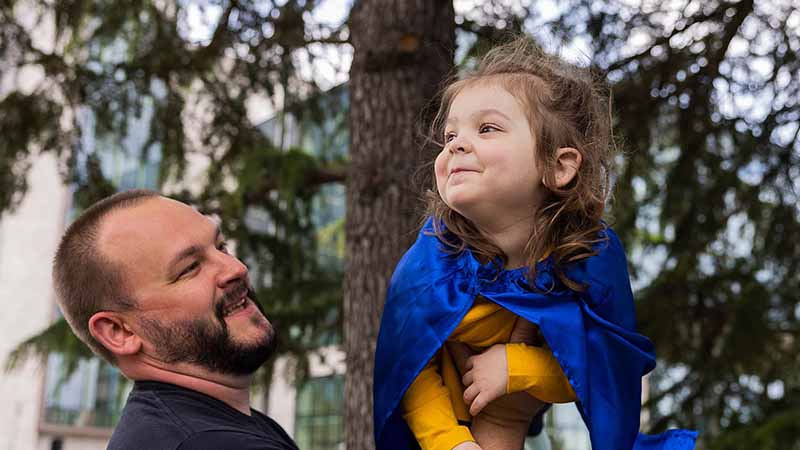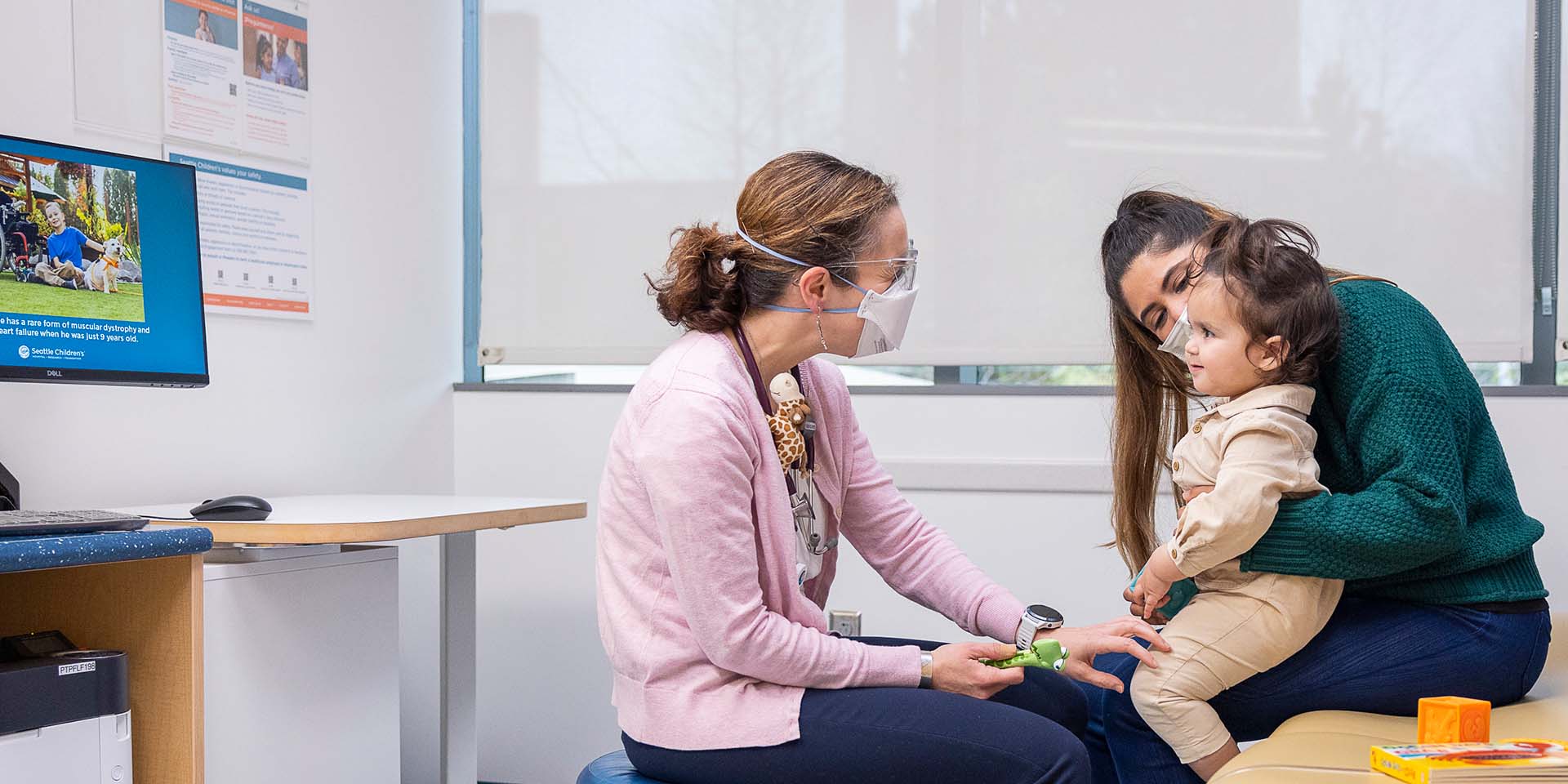
Resources to support your child’s health and care at home
Access links to handouts, videos and more from Seattle Children’s, and reputable sources outside of Seattle Children’s.
If you need educational resources that are not listed here, please contact your clinic.
Search
Search results
-
Seattle Children’s 22q Clinic brings together experts in many fields to care for children who have differences in a part of chromosome 22 called q11.2.
-
Seattle Children’s 22q Clinic brings together experts in many fields to care for children who have differences in a part of chromosome 22 called q11.2.
-
22q11.2-related disorders are caused by differences in part of chromosome 22, called the q11.2 region. Symptoms vary widely, even in members of the same family.
-
To plan the best treatment for your child, Seattle Children's craniofacial team uses 3-dimensional CT scans and advanced software to build precise maps of your child's face and head.
-
At Seattle Children's, Health Information Management and Medical Records Requests maintains all of our patients’ medical records. Contact us when you want to request copies of your child’s health information. We are located at the 70th and Sand Point Administrative Building in Seattle.
-
ABA Early Intervention Program
Seattle Children’s ABA Early Intervention Program is an intensive, short-term program where kids with autism learn new skills to improve learning and behavior.
-
ACL injuries are damage to a knee ligament. Seattle Children’s physical therapists and orthopedic specialists provide nonsurgical and surgical treatments.
-
About Newborn Hearing Screening
About infant hearing tests - how they work, what they tell us, risks and procedures.
-
Odessa Brown Children’s Clinic (OBCC) is a medical home for our families and more. Our team reflects the communities we serve and advocates for their well-being.
-
About the Alyssa Burnett Adult Life Center
Seattle Children’s Alyssa Burnett Adult Life Center helps people 18 and older with autism spectrum disorder and other developmental disabilities build on their strengths, gain independence and take part in the larger community in a meaningful way.
-
About the Financial Assistance Program
Frequently asked questions about Seattle Children’s Financial Assistance Program. The program may be able to help even if you have insurance. It is based on family size and income.
-
Seattle Children’s Acute Kidney Injury Clinic screens and monitors patients who have had an episode of AKI in order to prevent future kidney damage.
-
Learn about treatment options for acute lymphoblastic leukemia (ALL), cancer of the blood and bone marrow. Experienced experts at Seattle Children’s provide the most advanced diagnostics and treatments, including next-generation sequencing, targeted therapy, chemotherapy and stem cell transplants.
-
Learn about treatment options for acute myeloid leukemia (AML), cancer of the blood and bone marrow. Experts at Seattle Children’s provide the most advanced diagnostics and treatments. These include next-generation sequencing, targeted therapy, chemotherapy and stem cell transplants.
-
Adaptive Sports Physical Therapy Program
Seattle Children’s has the only program in the Seattle area offering specialized sports injury rehabilitation for athletes with disabilities.
-
Use these resources to find additional programs and services to support your family. These experts offer unique ways to engage in learning during these challenging times.
-
Adjustable Pediatric Heart Stent Moves to Pivotal Trial
Adjustable Pediatric Heart Stent Moves to Pivotal Trial - Seattle Children's Cardiac Beat, Winter 2023
-
The Adolescent Medicine Program at Seattle Children's provides care for teens, including treatment for eating disorders, obesity, substance abuse, behavioral concerns, chronic pain, gynecological health, transgender care and adolescent male health.
-
Adolescent Partial Hospitalization Program (PHP)
The Adolescent Partial Hospitalization Program (PHP) provides intensive mental health services to children and adolescents.
-
Adolescent and Young Adult Cancer Program
Our Adolescent and Young Adult (AYA) Cancer Program provides expert care and support for teens and young adults into their late 20s with all forms of cancer.
-
Adolescent and Young Adult Cancer Program
Adolescent and Young Adult Cancer Program
-
Adult Congenital Heart Disease Program (ACHD)
If your child was born with a heart defect, the Adult Congenital Heart Disease Program helps meet their long-term needs. We prepare patients to transition to adult care.
-
At Seattle Children’s Aerodigestive Program, we treat children, from birth to age 21, who have complex upper airway, breathing and swallowing problems.
-
What to expect about treatment and follow-up visits after your child’s kidney transplant at Seattle Children’s Kidney Transplant Program.
-
What to expect regarding treatment and follow-up visits after your child’s liver transplant at Seattle Children’s Liver Transplant Program.
-
A panel of experts from Seattle Children’s Neurology, Epileptology and Neurosurgery Programs will be discussing best practices and novel approaches to managing and treating epilepsy to improve outcomes.
-
Seattle Children's Airway and Esophageal Center provides comprehensive care for all children with complex breathing and swallowing conditions.
-
All Clinics and Programs (A to Z)
Find Seattle Childre's Hospital clinics, departments or programs. Alphabetical list of all of clinics, departments and programs.
-
Search pediatric medical conditions by name. All childhood medical conditions listed alphabetically
-
These guidelines (topics) are intended to help you determine how sick your child is and if you need to call your child's doctor. Their second purpose is to help
-
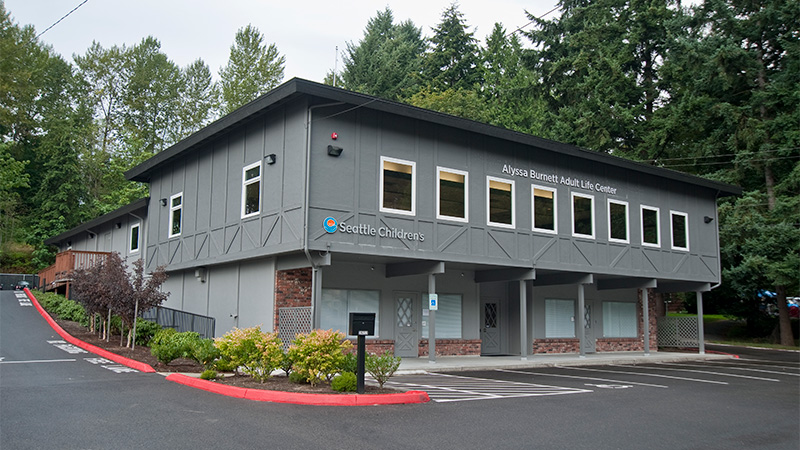
Alyssa Burnett Adult Life Center
Seattle Children's Alyssa Burnett Adult Life Center is a community that enhances the life of adults with developmental disabilities after they age out of school.
-
While babies are in the womb, a sac of fluid surrounds and protects them. In amniotic band syndrome, thin strands of tissue form inside this sac. Pressure from the strands can affect the way your baby forms.
-
Dr. Shaquita Bell shares an update to the community on current and future happenings at OBCC. Read her letter.
-
Seattle Children's anesthesiologists ensure your child's safety and comfort during procedures.
-
Learn about anxiety. Seattle Children’s provides group-based, individual and intensive outpatient treatment for children and teens with anxiety disorders.
-
Learn about aortic stenosis. Seattle Children’s Heart Center provides treatment options that include cardiac catheterization and surgery.
-
Apert syndrome is a rare genetic form of craniosynostosis — the early closing of 1 or more of the soft, fibrous seams between the skull bones (sutures).
-
Help families feel confident about getting care at Seattle Children’s; answer questions about the program and how our compassionate experts will treat children and teens.
-
Learn about treatment options for aplastic anemia, which makes the bone marrow shut down and stop making new blood cells. Doctors at Seattle Children’s are nationally known for diagnosing and treating children with bone marrow failure disorders like aplastic anemia.
-
Each year Seattle Children’s surgeons perform hundreds of procedures to treat children with an inflamed appendix. This is called appendicitis.
-
An arachnoid (pronounced ah-RACK-noid) cyst is a sac filled with fluid inside the head or spine. Arachnoid cysts develop between the brain or spinal cord and a membrane that covers the brain and spinal cord, called the arachnoid membrane. The fluid in the cyst often is cerebrospinal fluid (CSF), a clear liquid that
-
Learn about arrhythmia and the treatment options. Seattle Children’s Heart Center has a special program just to care for children with an abnormal heart rhythm.
-
Learn about treatment options for tangles of blood vessels called arteriovenous malformations (AVMs). Seattle Children’s Vascular Anomalies Program is nationally known for treating children with AVMs. Your child will get care from an experienced team of experts.
-
Arthrogryposis means a child is born with joint contractures. This means some of their joints don’'t move as much as normal and may even be stuck in one position.
-
Explore past articles featured in Seattle Children's Cardiac Beat newsletter.
-
Seattle Children’s Athletic Training Program provides on-site licensed athletic trainers to schools and other organizations during practices, at home and away games and at other sporting events.
-
Seattle Children’s Athletic Training Program provides on-site licensed athletic trainers to schools and other organizations during practices, at home and away games and at other sporting events.
-
Treatment for atrial septal defect is not always needed. Some children need catheterization or surgery to close the hole between their atria.
-
Atrioventricular Septal Defect
Learn about atrioventricular septal defect and the treatment options. Seattle Children’s Heart Center cares for babies, children and teens who need or have had surgery to repair their heart.
-
Attention Deficit Hyperactivity Disorder
Learn about attention deficit hyperactivity disorder (ADHD). Seattle Children’s provides diagnostic evaluations and treatment plans for children with ADHD.
-
Pediatric audiologists at Seattle Children's diagnose and treat hearing loss in children from birth through young adulthood.
-
Augmentative and Alternative Communication
Therapists with Seattle Children's Augmentative and Alternative Communication Program provide evaluation, training and short-term treatment for children with speech problems.
-
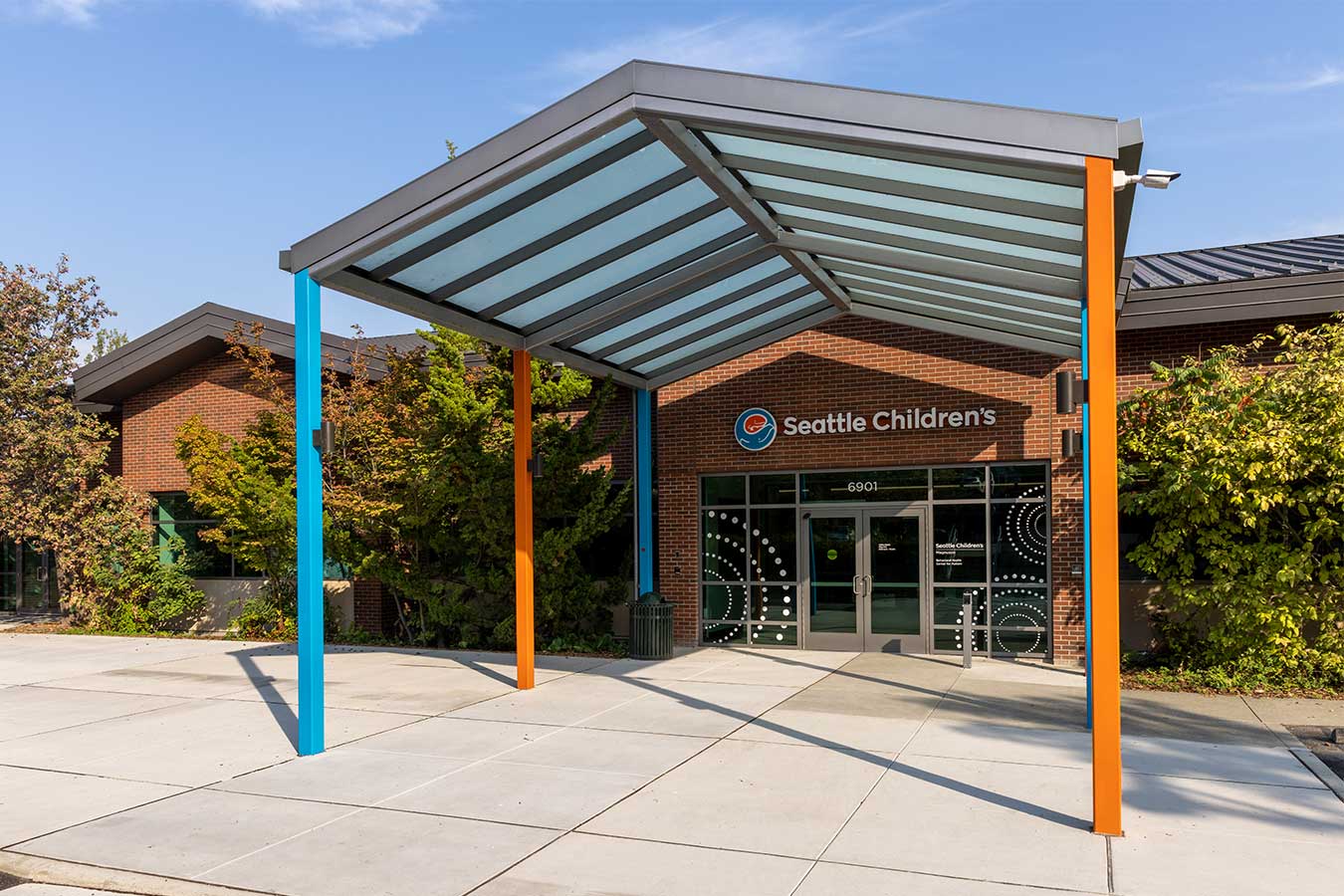
Seattle Children’s Autism Center provides high-quality treatments and services for children, teens and young adults with autism spectrum disorder and their families.
-
Autoimmune Kidney Disease Clinic
Seattle Children’s Autoimmune Kidney Disease Clinic diagnoses and treats infants, children and teens with autoimmune disease that affect the kidneys.
-
Anything that puts stress on the bones, tissues or nerves of the spine can make your child’s back hurt.
-
What to expect from your pre-transplant evaluation at Seattle Children’s Kidney Transplant Program and how to cope with the stress of waiting for a transplant.
-
What to expect from your pre-transplant evaluation at Seattle Children’s Liver Transplant Program and how to cope with the stress of waiting for a transplant.
-
Behavior and Attention Management Program
The Behavior and Attention Management Program serves children and teens ages 5 to 15 with disruptive behavior or attention problems, like attention deficit hyperactivity disorder (ADHD), and their families.
-
Behavioral Health Crisis Care Clinic
The Behavioral Health Crisis Care Clinic at Seattle Children’s helps children and teens having a mental health crisis that is not an emergency.
-
Bellevue Clinic and Surgery Center
Our Bellevue Clinic and Surgery Center serves families in east King County. The center offers services in more than 30 pediatric specialties and urgent care – provided by the same doctors and nurses who care for children and teens at our hospital in Seattle.
-
Biliary atresia is a liver condition occuring when a baby's bile ducts do not form normally.
-
Information on how to pay for care at Seattle Children’s.
-
Pediatric experts in Seattle Children's Biochemical Genetics Program diagnose and treat problems with how the body makes or uses proteins, fats or carbohydrates (metabolic diseases).
-
Seattle Children's Biofeedback team helps children, adolescents and young adults learn how to control the way their nervous system responds to stress and pain.
-
Seattle Children’s is very experienced treating babies who did not get enough oxygen before, during or right after birth. This is called birth asphyxia.
-
Learn about treatment options for birthmarks, flat, discolored marks on the skin with irregular borders. Seattle Children’s Vascular Anomalies Program will diagnose and treat all types of birthmarks as needed. Birthmarks are also called macular stains, stork bites, salmon patches and angel kisses.
-
Bladder exstrophy is a bladder that is not formed right and sits outside the body. Seattle Children’s is a Center of Excellence for Exstrophy.
-
Bladder and Bowel Health Program
The Bladder and Bowel Health Program at Seattle Children's cares for children from 6 to 21 years old who have problems controlling their bladder or bowels.
-
Seattle Children’s Blood Conservation Program offers options for families who prefer that their child not receive blood products or a blood transfusion.
-
Children with bone marrow failure can’t make enough blood cells to fight infection, carry oxygen and form clots to stop bleeding. Seattle Children's Bone Marrow Failure Program will form a multidisciplinary team to care for your child. We offer advanced treatments such as stem cell transplants.
-
Bone Tumors and Soft Tissue Tumors
The Brain Tumor Program cares for children, teens and young adults who have tumors in their brain or spinal cord. We treat both cancerous and benign tumors.
-
Bone Tumors and Soft Tissue Tumors
Learn about bone tumors and soft tissue tumors and treatment options. Seattle Children’s Bone Tumor and Sarcoma Clinic is the most experienced in the Northwest. We are experts at treating all types of bone and soft tissue tumors in children and young adults, whether benign or cancerous (sarcomas).
-
Bowel Management Treatment Program
Seattle Children’s Bowel Management Treatment Program helps children ages 3 to 21 who may have trouble controlling their bowels because of a condition affecting their pelvic area. Our outpatient program helps children and teens control their bowels without having accidents or needing to wear a diaper.
-
The Brachial Plexus Program at Seattle Children's diagnoses and cares for children who have problems with nerves that go to their arm (most often brachial plexus palsy).
-
A brachial plexus palsy happens when the nerves of the brachial plexus have been damaged, meaning some or all of a child’s arm muscles may no longer work.
-
Brain Abscess or Spinal Abscess
Rarely, pus from infection collects in the brain or spine, forming an abscess. If a child gets one, doctors in our area send their patients to Seattle Children’s.
-
With the nation’s top leaders in brain tumor care and research, Seattle Children’s Brain Tumor Program offers some of the most advanced treatments of any children’s hospital.
-
Brain Tumor Research Using Nanotechnology
Brain tumors are the second-most common form of cancer that affects children. They are the number one cancer killer of children.
-
Seattle Children's provides expert care from diagnosis of your child’s brain tumor (whether cancerous or benign) through treatment and long-term follow-up care.
-
Bronchopulmonary Dysplasia Program
Seattle Children’s Bronchopulmonary Dysplasia (BPD) Program is an expert team focused on caring for babies and children with long-term lung problems called BPD.
-
The Child and Adolescent Latino Mental Health Assessment and Treatment (CALMA) Clinic at Seattle Children’s serves Spanish-speaking children and families.
-
CAR T-Cell Immunotherapy Clinical Trials for Brain and Spinal Cord Tumors
Trials at Seattle Children’s are currently testing CAR T-cell therapy in infants, children and young adults with recurrent or refractory brain or central nervous system tumors who are not likely to survive with current treatments. These trials are known as BrainChild.
-
CAR T-Cell Immunotherapy Clinical Trials for Leukemia and Lymphoma
Trials at Seattle Children’s are currently testing CAR T-cell therapy in infants, children and young adults with relapsed or refractory acute lymphoblastic leukemia (ALL) or lymphoma who are not likely to survive with current treatments. These trials are known as Pediatric Leukemia Adoptive Therapy (PLAT).
-
CAR T-Cell Immunotherapy Clinical Trials for Solid Tumors
Our doctors and researchers are leaders in developing chimeric antigen receptor (CAR) T-cell immunotherapies to treat children and young adults with relapsed or refractory solid tumors who are not likely to survive with standard treatments. These phase 1 trials are called STRIvE.
-
Cancel an Appointment at Seattle Children's Hospital
Use this form to cancel your appointment at Seattle Children's Hospital.
-
Seattle Children’s Cancer Predisposition Clinic
Seattle Children’s Cancer Predisposition Clinic screens and cares for children born with a gene change that raises cancer risk. Finding tumors early may improve outcomes.
-
Seattle Children’s Cancer Survivor Program helps children, teens and young adults stay healthy after cancer treatment. We welcome all cancer survivors.
-
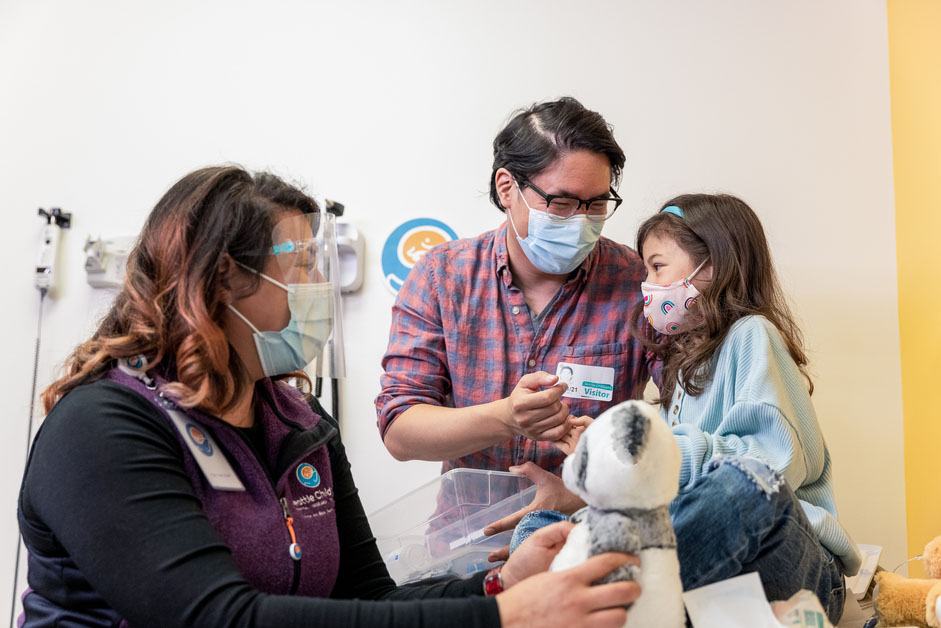
Cancer and Blood Disorders Center
The Cancer and Blood Disorders Center at Seattle Children's Hospital is consistently ranked among the top pediatric oncology programs in the Pacific Northwest by U.S. News & World Report.
-
Cancer and Blood Disorders Center - Inpatient
Designed with patients, families and caregivers in mind, Seattle Children’s Cancer Care Unit has 48 private rooms filled with natural light.
-
Cancer and Blood Disorders Center – Inpatient
Seattle Children’s Cancer Care Unit is designed to keep caregivers and parents close to kids and to help patients feel safe and in control. Light and airy, each spacious room has a private shower, interactive media system and its own air filter.
-
Learn about treatment options for capillary malformations, discolored patches on the skin caused by problems with the tiny tubes that carry blood. Your child will get expert care at Seattle Children’s Vascular Anomalies Program. Our program is 1 of the largest and most experienced in the nation.
-
What to expect if your child is having a cardiac catheterization procedure at Seattle Children’s to diagnose or treat a heart condition without surgery.
-
Cardiac Catheterization Procedures
Seattle Children’s offers cardiac catheterization procedures to diagnose and treat heart problems in children without the need for open-heart surgery.
-
Seattle Children’s Cardiac Genetics Program diagnoses and treats children with genetic conditions that raise the risk for thoracic aortic aneurysm, aortic dissection or other serious blood vessel problems.
-
Cardiac Intensive Care Unit (CICU)
The CICU is a distinct unit, staffed by a distinct team of providers, where babies, children, teens and young adults who are critically ill with heart problems are cared for by a medical team with special training and expertise.
-
Cardiac Intensive Care Unit (CICU)
On Seattle Children’s Cardiac Intensive Care Unit, a specially trained team cares for babies, children, teens and young adults who are critically ill with heart problems. We are also here to support your family during your child’s stay.
-
Cardiac Intensive Care Unit’s Nursing Team’s Quality Improvement Project Reduces VAT in CICU by 34%
Cardiac Intensive Care Unit’s nursing team’s quality improvement project reduces VAT in CICU by 34% - Seattle Children's Cardiac Beat, Winter 2023
-
The Cardiac MRI Program at Seattle Children’s uses radio waves, magnets and a computer to make pictures of your child’s heart and major blood vessels with no radiation.
-
Cardiac Neurodevelopmental Clinic
The Cardiac Neurodevelopmental Clinic at Seattle Children’s evaluates and treats babies and children born with complex heart defects who had heart surgery before age 1.
-
Cardiomyopathy is a disease of the heart’s muscular wall. It can cause changes that make the heart muscle weak, stiff or both.
-
Cavernous malformations are clusters of abnormal blood vessels. When the form in the brain, they are called cerebral cavernous malformations (CCMs).
-
Children with cavus foot have arches that are much higher than usual. Often, their heels point inward, and all of their toes are flexed.
-
The Celiac Disease Program at Seattle Children’s Hospital is dedicated to helping children with celiac disease enjoy healthy, symptom-free lives.
-
Center for Diversity and Health Equity
Seattle Children’s Center for Diversity and Health Equity (CDHE) strives to empower children and families at risk for health inequities, improving health outcomes for all children.
-
Seattle Children’s provides expert care so children with cerebral palsy (CP) have the best possible quality of life and function, now and as they grow.
-
Contracted interpreters accepting assignments at Seattle Children’s Hospital can receive a certificate of completion after completing the online interpreters orientation.
-
Seattle Children’s offers the most comprehensive care in the Pacific Northwest for children with Charcot-Marie-Tooth disease.
-
Seattle Children’s offers a wide range of medicines that attack cancer cells, including promising new chemotherapies offered only in clinical trials. We are experts in providing the supportive care children and teens need to receive chemotherapy safely and to recover fully.
-
What to expect if your child is having a chest X-ray at Seattle Children’s to check whether their heart and lungs look normal.
-
Seattle Children’s provides expert care to children with all types of Chiari malformations to help them get back to normal life, free of symptoms.
-
Scientists at Seattle Children’s Research Institute study the causes of Chiari malformations. This research may lead to innovative therapies.
-
Child Health Advice Disclaimer
This information is not intended nor implied to be a substitute for professional medical advice. Talk with your healthcare provider about any questions you may have regarding a medical condition.
-
Child Health Advice Instructions
How to use the Symptom Index feature. Reader's responsibilities, copyright information, when to call your doctor.
-
Seattle Children's Child Life programs include music therapy, art therapy, animal-assisted activities with Pet Partners and other activities to help make your family's experience at the hospital a positive one.
-
Seattle Children’s Child Wellness Clinic team works with families to address the medical, nutritional, social, physical and emotional factors that contribute to weight gain in children.
-
Child and Young Adult Hip Preservation Program
The Child and Young Adult Hip Preservation Program at Seattle Children’s offers complete care for children, teens and young adults with a wide range of hip conditions. We offer many treatments and services, both with and without surgery.
-
Childhood Communication Center
The Childhood Communication Center provides care for children with hearing loss and speech problems. We offer the only program in the region to evaluate voice disorders in children.
-
Choledochal cyst is a problem with the tubes (ducts) that carry bile from your child’s liver to their gallbladder and intestine. The tubes get bigger than normal (dilate) or pouches form on the tubes. This keeps bile from flowing well, which can cause liver problems.
-
Chronic Recurrent Multifocal Osteomyelitis Program
Seattle Children’s Chronic Recurrent Multifocal Osteomyelitis (CRMO) Program gives expert care to children with CRMO, a form of chronic nonbacterial osteomyelitis (CNO). It causes pain and damages bones.
-
Classes, Outings and Support Groups
Seattle Children’s Alyssa Burnett Adult Life Center offers classes, outings and more for people ages 18 or older with autism and other developmental disabilities.
-
To help your baby thrive, our nurses and infant-feeding specialists help you with techniques and supplies for infants with cleft lip or palate.
-
Cleft lip and cleft palate happen when part of the lip or roof of the mouth does not form properly. Seattle Children’s cares for over 1,000 children with clefts each year.
-
Clinica de Otorrinolaringología en Español
En la Clínica de Otorrinolaringología en español ofrecemos atención médica en español para problemas de los oídos, nariz, garganta y de la cabeza y cuello (Otorrinolaringología y Cirugía de Cabeza y Cuello).
-
Seattle Children’s Clinical Nutrition Program provides assessment and counseling for babies, children and teens with a wide range of conditions that affect diet, eating and growth.
-
Clubfoot is when babies are born with one foot or both feet pointing down and in. Their toes point toward the opposite leg, and the bottom of their feet face inward.
-
Clínica de Urología en español
The Spanish Urology Clinic at Seattle Children’s treats babies, children and teens with common and complex conditions that affect their urinary tract or genitals.
-
Coarctation of the aorta means the aorta has a narrow spot. Without treatment, the heart may not be able to pump enough blood to meet the body’s needs.
-
Cobertura del seguro médico para salud mental
Preguntas más frecuentes sobre la cobertura del seguro médico para salud mental
-
Seattle Children’s Cochlear Implant team assesses if a cochlear implant will help your child hear and communicate, places the device and provides follow-up care.
-
What to expect if your child is coming to Seattle Children’s Heart Center for common heart tests.
-
Community Measurement and Innovation Hub
Odessa Brown Children’s Clinic's Community Innovation Hub learns from and works with the community to continue providing the best care possible to patients and their families.
-
Community Programs and Classes
Odessa Brown Children’s Clinic (OBCC) helps meet needs related to food and fitness, emotional well-being and physical safety through support groups and education programs.
-
Complex Monochorionic Multiples Management
We offer complex monochorionic multiples management for your patients, including consultations and expectant management at Seattle Children’s Fetal Care and Treatment Center.
-
Comprehensive Care for Your Child
Seattle Children’s has many years of experience caring for children and teens with conditions that require stem cell transplants.
-
A concussion is a type of brain injury caused by a bump or blow to the head or body that causes the brain to move back and forth quickly inside of the skull. You do not have to lose consciousness to have a concussion.
-
Seattle Children's Concussion Program brings together some of the nation’s top experts on concussions and brain injuries. Because of this expertise, we can evaluate, diagnose and manage any level of injury to your child’s brain.
-
Seattle Children’s Fetal Care and Treatment Center diagnoses and treats a wide range of conditions that can affect developing babies before birth.
-
We offer treatment from birth through young adulthood for the whole range of gastrointestinal and liver diseases.
